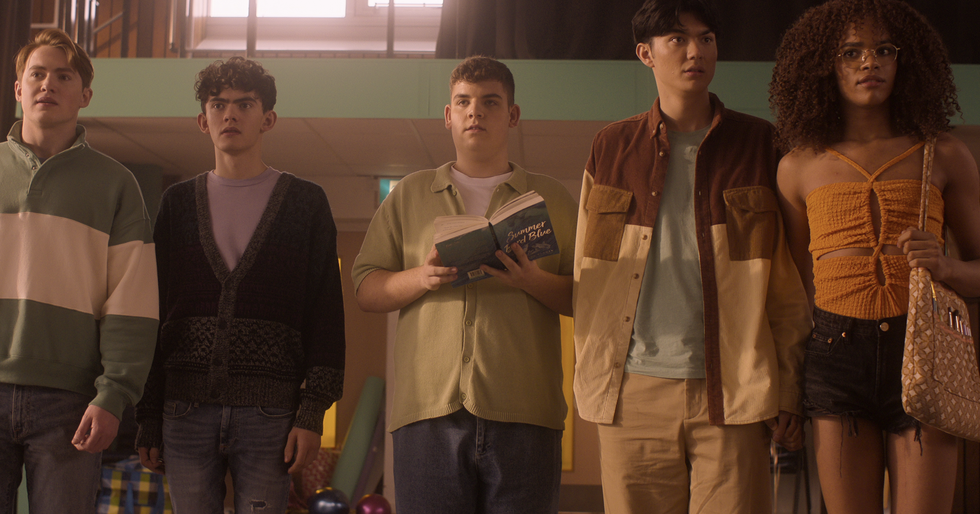
Heartstopper is undoubtedly one of the most loved queer shows out there. The Netflix adaptation of the graphic novel of the same name by Alice Oseman stole everyone’s heart when it first aired in 2022. Nick and Charlie, the show’s protagonists, quickly became the Internet’s most adored teens, and their friends, Tao and Elle’s slow-burn romance made everyone desperately wish for the two to admit their feelings out loud. The cute relationship between Elle’s newly found friends, Tara and Darcy, made the audience swoon, but one character that remained on the sidelines of the growing group of friends was Isaac, Charlie’s confidant and the book-loving introvert.
Season 2, which aired in 2023, made amends and delved deeper into Isaac’s storyline as we saw him go through the tough and often lonely road of coming to terms with one’s sexuality. The show managed to do an exceptional job of conveying the isolation of realising that your feelings of love and attraction are vastly different from accepted norms and expectations. There were several scenes throughout the season when Isaac found himself surrounded by couples making out. The discomfort he felt in these moments was very evident but one particular scene that stood out for me was when he was standing alone in the middle of Tara’s party, crying after the kiss between him and James. The vulnerable moment of realisation, when Isaac acknowledged that he does not feel romantic or sexual attraction, vividly and intricately conveyed the deep sense of loneliness he felt even among queer friends.
The show also brought attention to the omnipresence of allonormativity, the belief that all humans experience sexual and romantic attraction to other people, in our society. In a truth or dare scene when Isaac reveals that he doesn’t have any celebrity crushes, Imogen responds by remarking that everybody has celebrity crushes. The exchange between Isaac and Imogen reflects the pervasive nature of ideals of romantic and sexual attraction in society. The assumption that everyone experiences love and attraction in a similar manner is deeply alienating and harmful for the a-spec community, which includes individuals whose identities lie on the asexual and/or aromantic spectrum. Another scene that bluntly reflects the reality of the a-spec community on the screen is when James tells Isaac that he probably hasn’t found the right person yet. Even though the remark is well-intentioned, it is something that is deeply invalidating to hear because it reinforces the false idea that one’s sexuality can be ‘fixed’ or ‘changed’ if only one finds someone attractive enough. Such misconceptions oversimplify the complexities of individual identities and ignore the diversity of experiences within the a-spec community. Even Isaac’s closest friends expect him to date James since they automatically assume that Isaac is romantically attracted to him. Such an assumption is rooted in amatonormativity, the idea that everybody pursues love or romance, especially by means of a monogamous relationship. This further pressurises and alienates Isaac, causing him to snap at his friends.
Reflecting on Isaac’s journey, I was reminded of another novel by Alice Oseman, titled Loveless (2020), which also has a protagonist who is navigating her identity as an asexual and aromantic person in an allonormative world. The production team gave a nod to the book by placing it in the background of the pivotal scene where Isaac tells James that he isn’t attracted to him. Loveless played an essential role in my own journey of self-exploration, but it was witnessing Isaac’s character traverse the road of struggle and acceptance that truly hit the nail on the head for me. Isaac’s confusion and internalised allonormativity which made him wonder if there was something wrong with him reminded me of my own struggles of coming to terms with my identity. The feeling of being ‘broken’ is all too familiar and the show did a good job of highlighting the suffocation and isolation that the experience entails.
Isaac’s character underscores the importance of diverse representation in visual media, especially popular entertainment shows since it not only sheds light on marginalised identities but it also allows one to feel seen and accepted. The show made a significant intervention in the depiction of queer identities by showcasing Isaac’s journey of self-exploration and acceptance since the depiction of sexuality often remains constricted to kissing and sex scenes between allonormative couples even though the realm of sexuality and relationships is much bigger than that. The scene depicting Isaac’s encounter with an art installation about the experience of being aromantic and asexual was captivating. It aptly showed how fellow community members play a major role in self-acceptance since it was Isaac’s conversation with a fellow aromantic and asexual individual that made him feel understood. Moreover, the production team’s subtle yet impactful choice of incorporating the song Crush Culture by Conan Gray, further enhanced the scene’s resonance since the song is an anthem for a-spec community.
The final scene in which Isaac visits the library to pick up Angela Chan’s Ace: What Asexuality Reveals about Desire, Society, and the Meaning of Sex (2020) is a cathartic and perfect ending to his character development throughout the season. It signals Isaac’s step towards a sense of contentment and curiosity about his identity. The scene conveys to its viewers that the way to self-acceptance is to be curious about oneself and to be open to the discomfort that comes along with it because it is worth the joy of living one’s truth. Watching Isaac go through the ups and downs of learning about one’s identity and coming out happier is something that I wish for every a-spec person who is starting their journey of self-acceptance. In its essence, the show serves as a gift wrapped in rainbow paper to every LGBTQ+ person looking for acceptance, understanding, and above all, freedom.
Cover Image: Samuel Dore for Netflix.